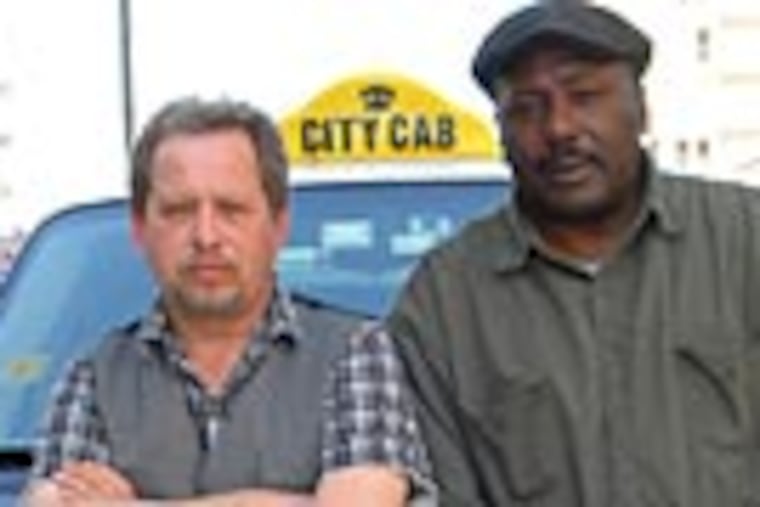Should cabbies be entitled to workers' comp?
Longtime cabbie Ralph Rescigno was partway into his overnight shift on July 20, 2005, when a call he answered in South Philadelphia turned into a robbery.

Longtime cabbie Ralph Rescigno was partway into his overnight shift on July 20, 2005, when a call he answered in South Philadelphia turned into a robbery.
Even though Rescigno handed over his cash, the assailants stabbed him in the back, puncturing both lungs. He managed to radio for help before collapsing in a pool of blood. Later, in the hospital, he suffered a stroke.
Wheelchair-bound now, Rescigno, 72, sleeps in a hospital bed on the first floor of his South Philadelphia rowhouse. He uses a commode. He can't speak. And when he needs to leave the house, two of his sons have to come over and lift him out.
His wife, Mary, 67, would like to go to City Hall tomorrow and testify at a public hearing about the need for cab drivers injured on the job to receive workers' compensation.
But there's no one to watch her husband.
"Cab drivers go out there and try to make a living and there's no compensation for them," she said. "It's not fair."
It may not be pleasant, but that's how it is, says Alex Friedman, secretary of the Philadelphia Taxi Association, a group that owns the medallions for about half of the cabs in Philadelphia. In Pennsylvania, a medallion is a government-issued license to run a cab - drivers lease the medallions.
"You have to realize they are independent contractors," said Friedman, who plans to attend tomorrow's hearing, sponsored by the Urban Affairs Committee of the Pennsylvania General Assembly.
The hearing, in Room 400 from 10 a.m. to noon, is to take testimony on the provisions of House Bill 1914 that would require medallion owners, such as Friedman, to guarantee minimum wage and provide workers' compensation. The bill would also set up a system for wheelchair-accessible service.
The question of whether cab drivers deserve workers' compensation turns on an issue gaining increasing scrutiny in the marketplace as companies use more and more independent contractors to do work formerly handled by employees.
"Are they independent contractors or are they not?" said George Martin, a partner in Martin, Banks, Pond, Lehocky & Wilson, a Center City law firm that specializes in workers' compensation.
"The key to it is determining who controls the work."
No matter who controls the work, driving a cab is one of the nation's most dangerous occupations, with more fatalities per 100,000 workers than law enforcement or firefighting. According to the most recent statistics from the U.S. Labor Department, 69 taxi drivers and chauffeurs died on the job in 2008. That's 19.3 workers out of 100,000.
Commercial fishing, logging, farming, and working on structural iron and steel are all more dangerous.
But cab drivers are prone to death and injury in two ways. Nationally, the top cause of workplace deaths is "highway incidents," or crashes, but close behind is workplace homicide, a particular threat for cabbies.
"They work in a cash-based industry and they deal with the public. They work very late at night. They can be called to pick up passengers in dangerous neighborhoods," said Cammie Chaumont Menendez, an epidemiologist with the National Institute for Occupational Safety and Health, a government group that researches and makes recommendations to prevent workplace industries and deaths.
Menendez specializes in workplace violence and is studying taxi driver deaths. She said the fact that many drivers are foreign-born also plays a role. "Communication is an issue," she said.
In Philadelphia, until the 1980s, cab drivers were considered employees, but during that decade, the work rules shifted, said Ronald Blount, who heads the Taxi Workers Association of Philadelphia, a quasi-union group that is pushing for the wheelchair service and for the workers' compensation.
"We believe we're misclassified" as independent contractors, said Blount, who has been driving a cab since 1983. For example, he said, cab drivers cannot turn the dispatch radio off during their shifts and they cannot grab a nap. There are monitors that track their every move - all signs, he said, of the kind of control an employer exercises over employees.
Friedman, not surprisingly, disagrees. He has a metaphor to explain it, which, gussied up for print, goes like this: The cab drivers cannot use one posterior to sit in two chairs - they cannot be independent contractors, but then get the benefits of employment.
"We do not pay them salary," he said. "We do not control their working hours. We do not tell them to go in certain routes. We operate separately. We do not tell them to turn their air-conditioning off and turn the heat on.
"They are not our employees. We are not their employers," he said. "Therefore we do not pay any workers' compensation, or health insurance, or dental."
Various cities have different approaches to the same issue.
In San Francisco, for example, workers are considered employees and are entitled to workers' compensation, said Ruach Graffis, an officer of United Taxicab Workers, a union-related group trying to organize San Francisco drivers.
But even with a law that requires workers' compensation signs to be posted in workplaces, drivers do not always get compensation, she said. That is because companies make drivers sign papers that they are independent contractors, even though the law says otherwise.
Getting the message out is hampered by high turnover and the proportion of foreign workers who may have little idea of workers' rights, she said. "When you are talking about the cab business, fear and intimidation runs the show."